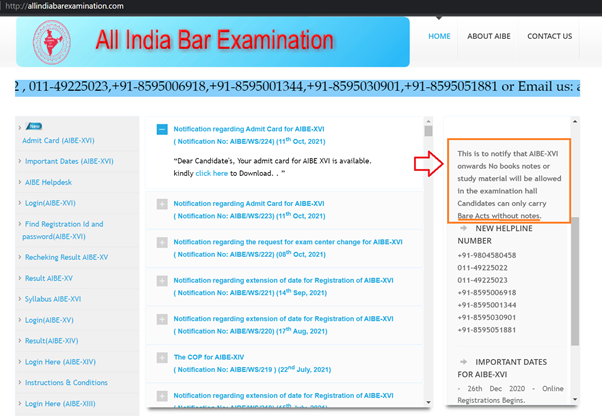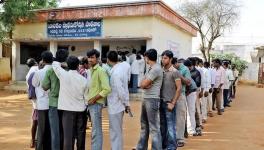Dissecting The Bar Council of India’s Recent Notification Allowing Candidates To Carry Bare Acts With Notes
Representational use only.
The Bar Council of India had released a notification somewhere in February 2021 to the effect that from the All India Bar Examination-XVI (AIBE-XVI) onwards, no books, notes, or study material will be allowed in the Examination Hall. For AIBE-XVI, candidates would be allowed to only carry the Bare Acts without notes.

On October 24, 2021, the All India Bar Examination released another notification stating that candidates will be allowed to use Bare Acts with short notes/comments during the examination scheduled to be held on October 31, 2021. The notification details that the reason for the recent notification is that the candidates were having difficulty in procuring the Bare Acts for the examination. In this piece, we have tried to map out the difficulties that candidates have been navigating for the past few months with respect to various policies surrounding the examination.
Many of the candidates relied on their seniors for accessing the Bare Acts for the examination. The notification has created an expectation for procuring new Bare Acts “without notes”, or “comments”, as most of the borrowed Bare Acts available included notes and comments as they were earlier allowed in the AIBE. As per our phone and email interaction with the All India Bar Examination team, we were informed that candidates were also not allowed to carry photocopies or printouts of the Bare Acts (which was an affordable option).
As per the syllabus provided on the AIBE website, it can be estimated that if a student wishes to carry all the Bare Acts in the syllabus, they would have to be carrying a total of 84 Bare Acts for the examination. While the decision to carry all the Bare Acts has little implication on those candidates who do not have any financial constraints, carrying just those Bare Acts that have the most weightage is a significant expense for many candidates appearing for the examination.
The examination is conducted in 11 languages - English, Hindi, Telugu, Tamil, Kannada, Marathi, Bengali, Gujarati, Oriya, Assamese, and Punjabi. While many students opt from the 10 vernacular languages as the medium of examination, the availability of these Bare Acts in these languages is a major impediment.
When it comes to vernacular languages, Bare Acts are not just unavailable on most of the popular e-commerce websites or bookstores, they are also more expensive. A set of 18 English Bare Acts costs around rupees 1,800/- on amazon, their translations are far more expensive. Procuring just 10 Bare Acts with the most weightage in Gujarati would cost close to 8,000, around 8 times more than their English counterparts. The following is the comparative price list (with the names of the publishers) of those Bare Acts:
| Sr. No. | Bare Acts | Publisher (Gujarati) | Price | Publisher (English) |
Price |
|---|---|---|---|---|---|
| 1 | The Consumer Protection Act, 2019 | Vinay Law House | 795 | Universal | 80 |
| 2 | The Advocates Act, 1961 | Punahal Law House | 450 | Universal | 59 |
| 3 | The Code of Civil Procedure, 1908 | Punahal Law House | 995 | Universal | 172 |
| 4 | The Right to Fair Compensation and Transparency in Land Acquisition and Rehabilitation and Resettlement Act, 2013 | Punahal Law House | 595 | Universal | 88 |
| 5 | The Indian Evidence Act, 1872 | Punahal Law House | 450 | Universal | 69 |
| 6 | The Code of Criminal Procedure, 1973 | Punahal Law House | 1,095 | Universal | 280 |
| 7 | The Indian Penal Code, 1860 | Punahal Law House | 895 | Universal | 187 |
| 8 | The Law of Contracts | Punahal Law House | 995 | Professionals | 225 |
| 9 | Family Laws | Punahal Law House | 995 | Universal | 243 |
| 10 | The Constitution of India, 1950 | Punahal Law House | 1,095 | Universal | 184 |
| TOTAL | 8,360 | 1,587 |
For students opting for AIBE in languages other than English, the impediments are multifold. Besides exorbitant prices, there is a dearth in supply of the Bare Acts. Publishers printing Bare Acts in vernacular languages are less in number, making the prices uncompetitive and therefore high. This is where the printouts or photocopies of the Bare Acts could have been a more affordable option for students to access a tool that is necessary for passing the exam. Exam candidates from rural areas and towns have also tried to travel to nearby towns or cities to purchase the Bare Acts. However, it has been observed that the availability is generally inadequate in quantity and quality. Furthermore, for subjects such as criminal law, family law, contract law etc, the Acts are available in the form of manuals which often contain notes or comments. This situation is aggravated for people from rural areas and marginalised communities due to the non-availability of book stores and barriers in accessing e-commerce websites.
Additionally, most publishers of Bare Acts in vernacular languages have not incorporated recent amendments or published recently enacted legislation (for example, Consumer Protection Act, 2019, Criminal Law Amendment Act, 2018, etc.). Thus, students are also forced to use outdated or repealed legislation.
The Bar enrollment and registration process, along with the fees incurred for the All India Bar Examination, already exclude large categories of students from entering the profession of litigation. Hence, any further hindrance in this process would have further excluded students. After paying exorbitant enrollment fees, the bar should ensure that candidates have the tools that are required for clearing the exam at affordable prices.
While the decision by the All India Bar Association to allow Bare Acts with comments is welcome, it came a little too late as most candidates would not have waited for the week before the exam to procure the Bare Acts and therefore many would have been forced to take this decision. Action needs to be taken by respective State Bars to ensure that Bare Acts in vernacular languages with the latest amendments are available in their state, that too at affordable prices. Till this happens, students should not be forced to incur such expenses and should be allowed to carry printouts of the Bare Acts.
Gatha and Tanvi Singh are Research Associates at the Centre for Social Justice, Ahmedabad. The authors are associated with the Centre for Social Justice, an organisation involved in providing legal representation to marginalised communities in Gujarat, Jharkhand and Chhattisgarh.
Get the latest reports & analysis with people's perspective on Protests, movements & deep analytical videos, discussions of the current affairs in your Telegram app. Subscribe to NewsClick's Telegram channel & get Real-Time updates on stories, as they get published on our website.
























